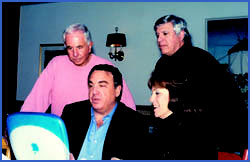Editor's
Note
New
Twists for 2001
Dan
Osman’s guiding principal for almost two decades of directing
the Miami Breast Cancer Conference has been, "What can you learn
from this conference that you can use Monday morning, and what
can you look forward to on Friday?" He explains that, "We always
ask our speakers to address the toughest clinical situations and
tell our audience how they would manage such patients, but we
also want to help the registrants see what’s coming down
the pike over the next few years. Doctors attending our conference
enjoy that because they inherently know there’s a new shift
in thinking on breast cancer management."
This
educational supplement reflects the juxtaposition of cutting-edge
research information and emerging new interventions that imbue
our meeting. The clinical trials guide organizes almost 200 breast
cancer studies currently listed by the National Cancer Institute
and provides contact information for physicians who wish to enter
patients. While many practicing clinicians do not have the time
to participate in clinical research, understanding the background
for these studies and the rationale for trial designs can provide
valuable insight into future directions for breast cancer treatment.
We also hope that by outlining the very worthwhile objectives
of these studies, more physicians will be motivated to enter patients
or refer them for trial accrual. Currently, a disappointing three
percent of breast cancer patients are entered in clinical trials.
During the meeting, a special panel of clinical investigators
will discuss some of the most important ongoing studies and the
complex challenges trialists face in accruing patients.
A
relatively recent part of the "What can be used on Monday?" theme
is the meeting’s use of clinical interactive keypad questions,
which we have now utilized for the last four conferences. Dan
notes that, "It took us a couple of years to really understand
how to use this technology, but our attendees have evaluated this
very favorably. This year, it should be even more effective because
we are interacting very closely with the faculty prior to the
meeting to develop really challenging questions." Because of many
requests for copies of the entire set of questions and responses,
and for expert commentary on these issues, we produced the enclosed
report from the 2000 meeting with comments from Memorial Sloan-Kettering’s
Dr Pat Borgen and Dr Andy Seidman, who were on the faculty of
last year’s meeting. For 2001, we will be mailing a similar
report to all attendees several weeks after the conference. Another
enhancement in this year’s interactive program will be cases
that utilize short video comments from breast cancer survivors.
Often medical meetings do not include the human elements that
physicians encounter in clinical decision-making, and our intent
is to introduce this concept with these video cases.
Andrew
Seidman, MD, (left) and Patrick Borgen, MD, (right)
discuss interactive cases in the enclosed report
 Another
innovation for the current meeting is our first-ever poster session/reception.
For attendees not able to participate, we have included copies
in this supplement, and the posters will also be on display throughout
the meeting in the Poinciana Room, adjacent to the main meeting
area. In keeping with our practical clinical approach, many of
the posters are academic reviews of rapidly developing clinical
areas, where the research database is exploding. A number of the
posters were prepared by fellows in surgical, medical and radiation
oncology who are attending the meeting on a scholarship program
that was launched last year. Dan commented that, "Fellows often
have a very narrow exposure to the philosophic approaches of the
institutions where they trained. I believe their education would
be enhanced if they were exposed to our diverse international
faculty and attendees. We have had a fantastic response to our
scholarship program, and for 2002, we want to see these physicians
become even more involved in the poster session."
Another
innovation for the current meeting is our first-ever poster session/reception.
For attendees not able to participate, we have included copies
in this supplement, and the posters will also be on display throughout
the meeting in the Poinciana Room, adjacent to the main meeting
area. In keeping with our practical clinical approach, many of
the posters are academic reviews of rapidly developing clinical
areas, where the research database is exploding. A number of the
posters were prepared by fellows in surgical, medical and radiation
oncology who are attending the meeting on a scholarship program
that was launched last year. Dan commented that, "Fellows often
have a very narrow exposure to the philosophic approaches of the
institutions where they trained. I believe their education would
be enhanced if they were exposed to our diverse international
faculty and attendees. We have had a fantastic response to our
scholarship program, and for 2002, we want to see these physicians
become even more involved in the poster session."
"Breast
Cancer Web Tour" is reviewed at a monthly
directors planning meeting.
From left: Daniel Osman, MD; Neil Love, MD;
Lois Osman and Robert DerHagopian, MD.
(not pictured: Alan Lewin, MD)
 Finally,
this year we are bringing more Internet-based education into the
meeting because of the enormous potential this vehicle has to
provide information. Dan notes that, "More senior people like
myself need to develop a greater comfort level with the Internet.
I’m continuing to learn about it, but what I’ve seen
is very exciting." The "Breast Cancer Update" exhibit area (based
on our audio series) has a number of computers with high-speed
Internet access, which attendees can use during the meeting to
visit sites on a special "Breast Cancer Web Tour" that was set
up for this meeting. All of the enclosed material in this supplement
is also available via the meeting website (CancerConf.com) and
on BreastCancerUpdate.com.
Finally,
this year we are bringing more Internet-based education into the
meeting because of the enormous potential this vehicle has to
provide information. Dan notes that, "More senior people like
myself need to develop a greater comfort level with the Internet.
I’m continuing to learn about it, but what I’ve seen
is very exciting." The "Breast Cancer Update" exhibit area (based
on our audio series) has a number of computers with high-speed
Internet access, which attendees can use during the meeting to
visit sites on a special "Breast Cancer Web Tour" that was set
up for this meeting. All of the enclosed material in this supplement
is also available via the meeting website (CancerConf.com) and
on BreastCancerUpdate.com.
Michelle
Finkelstein, MD, (left) interviews a breast cancer survivor for
a video case presentation.
 The
classic research model of developing a hypothesis and then objectively
evaluating it can also be applied to cancer education. To that
end, the back cover of this binder includes an education needs
assessment that asks for feedback on this supplement and the new
additions to the 2001 conference, which we hope will enhance your
effectiveness on "Monday" and your understanding of what to expect
on "Friday."
The
classic research model of developing a hypothesis and then objectively
evaluating it can also be applied to cancer education. To that
end, the back cover of this binder includes an education needs
assessment that asks for feedback on this supplement and the new
additions to the 2001 conference, which we hope will enhance your
effectiveness on "Monday" and your understanding of what to expect
on "Friday."
—Neil
Love, MD
Top
of Page



